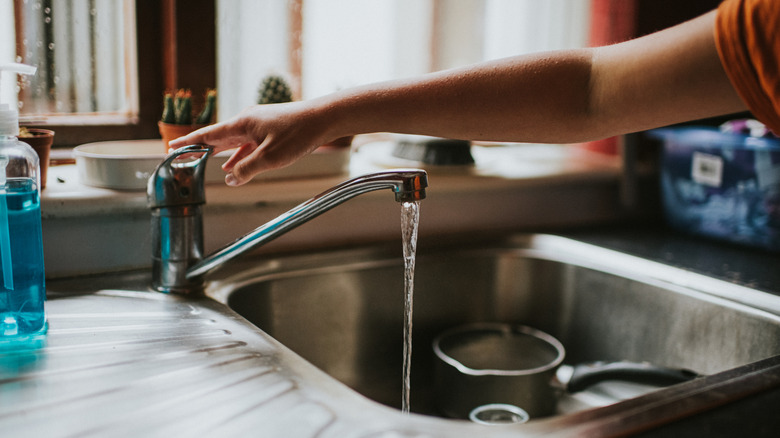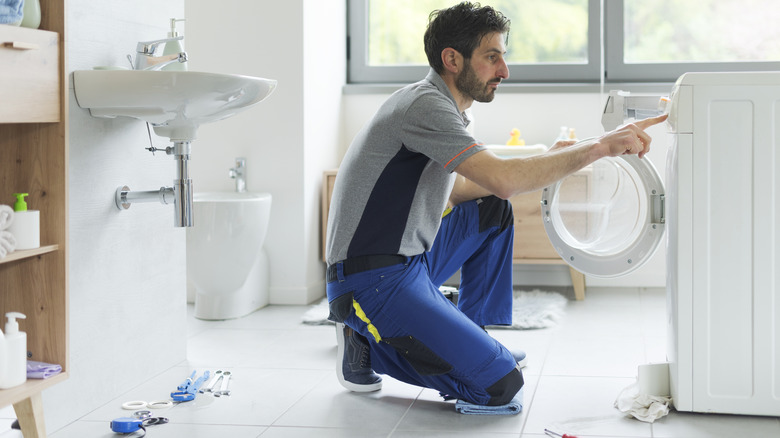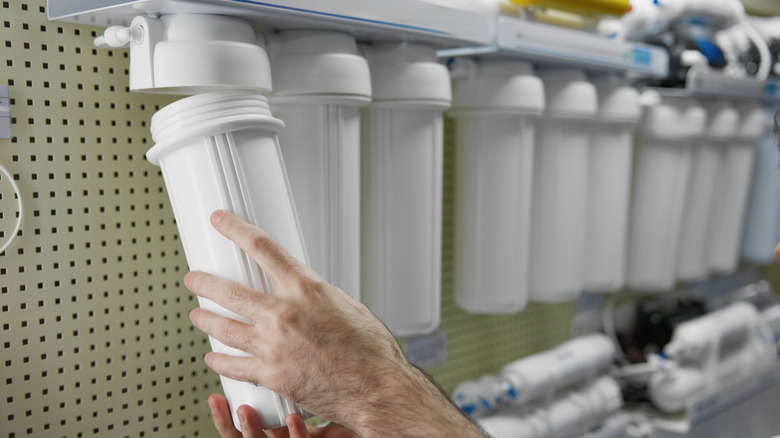Hard Water Vs Soft Water: Which Is Harming Your Home More?
When it comes to making your home run more smoothly, there are two things most people want to save: time and money. As it turns out, the hardness or softness of your water can impact both. Speaking exclusively with House Digest, Chuck Pound, virtual plumbing expert at Frontdoor, explained that hard water has high concentrations of minerals such as magnesium and calcium, while soft water's mineral content is much lower. However, both types have their unique challenges and will affect your home. "Depending on the levels of each, both can be harmful in their own way. Water that is too hard will leave deposits in the piping and appliances. On the other hand, water that is too soft will break down the piping and appliances it passes through." It seems that if your water isn't balanced, you may end up with more plumbing problems than you had bargained for.
Understanding the differences between the types of water is key to maintaining an efficient home because you can mitigate its effects. While you cannot change the mineral content (high or low) of your water, you are not at the mercy of your district's water supply. In fact, nowadays, you have a myriad of choices. Let's take a closer look at how the mineral quality of your water will actually affect your appliances, plumbing, and even shopping habits, and let's explore what you can do about it.
How water quality impacts your home and appliances
In his exclusive interview with House Digest, Pound described how both hard and soft water can affect your home. "[Hard water] leaves behind deposits that build over time. This causes fixtures and appliances to have shorter lives, leading to you needing repairs or replacements sooner. Additionally, hard water spots can be seen on and around faucet trims, which can be a look homeowners like to avoid." In other words, mineral-rich water will cost you in cleaning products and elbow grease if you haven't tried our tips and tricks to prevent hard water stains from building up in the toilet.
Soft water can also have a severe long-term effect. Usually, hard water will leave mineral deposits on your pipes, often minimizing the contact between the water and the plumbing itself. But, if there is no mineral build-up because your water is soft, this can have a corrosive effect on your copper pipes. The water is in direct contact with the plumbing and may cause pitting, or small pin-like holes that will cause leaks in your system. Pound also shared, "A con of soft water is that it causes soaps to over sud leaving a soapy-like film on both bathroom fixtures and the body," which equates to more cleaning for you. The plumbing expert continued, "Both too hard and too soft water can discolor or stain clothing you're putting through your washing machines." So how can you ensure that your water works for you and not against you?
Solving your water quality crisis
All is not lost when your water isn't playing nice. They key is to get a water test done by calling in the professionals, ordering a kit, or trying our simple way to test for hard water. Pound continued his exclusive interview with House Digest, saying, "You can purchase and use water softeners, which help regulate the hardness to a healthier level for your home and family. Always have the water tested to determine the type of system may work best for the type of water hardness or softness your home has." With your water test done, you can now choose the right treatment. Many homeowners install treatment systems, (even though there may be hidden downsides to building your own water softener) which help balance mineral levels and reduce harmful deposits or corrosion.
Along with treatment, regular maintenance goes a long way. Scheduling routine checks for your appliances and plumbing can help catch issues before they escalate. Simple steps like cleaning fixtures frequently and using appropriate detergents can also minimize the visible effects of hard and soft water, such as a mineral build-up on fixtures and soap scum. By staying proactive, you not only prevent costly repairs, but also create a more efficient, comfortable home environment. And at the end of the day, the less time and money you spend cleaning hard water marks and treating laundry stains, the more time you will have to enjoy your home.


